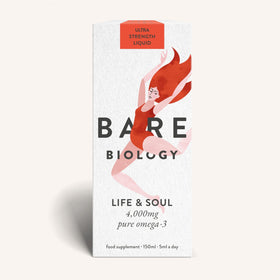Our omega-3 fish oil for brain health guide
CONTENTS
Understanding Omega-3's Impact on Brain Health
From whole grains to olive oil, we may be sold on the benefits of eating a heart-healthy diet to keep our arteries clear and blood pressure low. But how much thought do we put into nourishing that other hard-working organ, the brain?
Eating more oily fish or taking a good omega-3 supplement for brain health is a great first step in caring for our grey matter. In fact, the European Food Safety Authority (EFSA) approves the claim for DHA, one of the essential fatty acids in omega-3, to maintain normal brain function. Our ultimate guide to omega-3 and the brain will explain why.
So read on to discover how omega 3-benefits brain function and find out why it deserves its rightful place on your brain health menu.
The importance of food to the brain
We all know that our diets can have an effect on our bodies. The food we eat day after day can either whittle or widen our waistlines, make our complexions dull or clear and can even affect the quality of our hair and nails. But what many of us forget is that this same diet is shaping our brains, which in turn affects our thoughts, our learning and memory, as well as our emotions and feelings of well-being.
The brain is our body’s hungriest organ, taking up just 2% of our total body weight yet gobbling up more than 20% of its energy requirements. But the food we eat does more than just provide our brains with the fuel it needs for all that thinking. In fact, the quality of our daily diet can affect the structure of the brain and the way it functions.
Related Products

Does omega-3 nourish the brain?
Brain cells work differently to the other cells in our body. In our bodies, cells continuously die and are replaced, but the cells of our brain are irreplaceable and need a special kind of nourishing. The most important foods for our brain are glucose, vitamins and minerals and polyunsaturated long-chain fatty acids such as omega-3.
“Omega-3 fatty acids are involved in many different fundamental brain processes,” says Simon Dyall, head of nutrition at Bournemouth University. Talking to Time Magazine he says, “both EPA (eicosapentaenoic acid) and DHA (docosahexaenoic acid) influence gene expression, oxidative stress, cerebral blood flow, levels of neurotransmitters and other brain-related processes such as the production of new neurons.”
How does omega-3 help the brain?
The brain has a huge number of cell membranes and all of them are made out of fat. But not just any fat. Unlike the rest of the body, the only fatty acid allowed into healthy grey matter in appreciable amounts is the omega-3 fatty acid DHA.
Omega-3 DHA is vital for our brain throughout life, from early cognitive development in foetuses to learning and memory in adults. But the benefits of omega-3 DHA for the brain don’t end there. According to Dr Simon Dyall, “DHA is such an essential building block of the brain’s cell membranes that, like a house without bricks or walls, the brain could not exist without omega-3 fatty acids."

Which foods harm the brain?
The human brain has evolved over millions of years to function on a specific diet. However the food we put on our plates has undergone a huge change in the past 150 years, thanks to the industrialisation of food.
Before the industrial revolution our diets contained roughly the same amount of omega-3 and omega-6 fats. But thanks to modern farming methods and factory-made foods, we now eat far more omega-6 than omega-3. In the US the ratio is thought to be as high as 20:1.
According to Jonathan Tammam, a dietician and research scientist in the department of physiology, anatomy and genetics at the University of Oxford, omega-6 per se isn’t bad for us. He has said “the fatty acid in omega-6, arachidonic acid (AA), has an important function in brain chemistry. The problem is the amount and the proportion in comparison with our omega-3 intake.”
Omega-6 fats are high in oils such as canola, palm, corn, soy and sunflower. Both the food and restaurant industry love them as they’re cheap, easy to cook with and have a long shelf life. But many scientists believe this flood of omega-6 into our diets has taken a huge toll on our bodies...and our brains.
“Like a house without bricks or walls, the brain could not exist without omega-3."
Dr Simon Dyall

Benefits of Omega-3 for brain health
If you want a healthy brain you need to address the omega-6 to omega-3 balance in your diet, and a great way to do that is by eating more oily fish. While it's true that plants like avocados, walnuts, flax and chia do contain omega-3, they contain the least beneficial kind. Called alpha-linolenic acid, the body can turn ALA into DHA and EPA through a series of enzymatic reactions, but it’s not good at it. Less than 1 percent of the ALA we get from plant-based sources ultimately becomes the omega-3 we can use.
Fish and seafood are the main natural sources of the omega-3 fatty acids EPA and DHA, but we all find it hard to eat enough. That may be because we dislike the taste or that we’re worried about pollution. Current NHS advice is that we should only be eating a maximum of four portions of oily fish per week, with pregnant women limited to just two. That’s where a fish oil supplement such as Bare Biology, which is independently checked for purity, is a really good option as you can get enough omega-3 without the potential toxins.
The best fish oil you can take for your brain will have high levels of EPA and DHA per capsule or teaspoon. This information should be easy to find, not buried in the small print.
For the maintenance of normal brain function, the EFSA approves the claim for 250mg of DHA per day. Our Life & Soul clinical strength fish oil has all the essential fatty acids you need to get the full range of omega-3 brain benefits, with 3,500mg of omega-3 (2,000mg of EPA, 1,000mg of DHA and 500mg of other omega-3s) in every single teaspoon. If you prefer taking your DHA in capsule form we recommend Pure DHA Omega-3 Supplements. One daily capsule provides 560mg of DHA, the same amount as a tin of sardines!
So will omega-3 benefit your brain?
We’re all living longer, but wouldn’t it be nice to have a fully functioning brain with which to enjoy all those extra years? Besides keeping our minds busy with mental exercises and working out physically, having a good diet rich in omega-3 is key to keeping sharp as we age.






